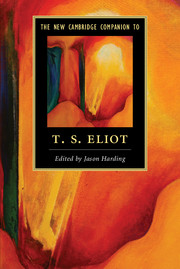Book contents
- Frontmatter
- Contents
- Notes on contributors
- Preface
- Chronology of Eliot's life and works
- List of abbreviations
- 1 Unravelling Eliot
- 2 Eliot: Form and Allusion
- 3 Prufrock and Other Observations
- 4 Banishing the Backward Devils: Eliot's Quatrain Poems and “Gerontion”
- 5 With Automatic Hand: The Waste Land
- 6 “Let These Words Answer”: Ash-Wednesday and the Ariel Poems
- 7 Four Quartets
- 8 “A Precise Way of Thinking and Feeling”: Eliot and Verse Drama 116
- 9 T. S. Eliot as Literary Critic
- 10 T. S. Eliot's Social Criticism
- 11 Gender and Sexuality
- 12 Eliot's Philosophical Studies: Bergson, Frazer, Bradley
- 13 “Anglo-Catholic in Religion”: T. S. Eliot and Christianity
- Select bibliography
- Index
- Miscellaneous Endmatter
11 - Gender and Sexuality
Published online by Cambridge University Press: 01 December 2016
- Frontmatter
- Contents
- Notes on contributors
- Preface
- Chronology of Eliot's life and works
- List of abbreviations
- 1 Unravelling Eliot
- 2 Eliot: Form and Allusion
- 3 Prufrock and Other Observations
- 4 Banishing the Backward Devils: Eliot's Quatrain Poems and “Gerontion”
- 5 With Automatic Hand: The Waste Land
- 6 “Let These Words Answer”: Ash-Wednesday and the Ariel Poems
- 7 Four Quartets
- 8 “A Precise Way of Thinking and Feeling”: Eliot and Verse Drama 116
- 9 T. S. Eliot as Literary Critic
- 10 T. S. Eliot's Social Criticism
- 11 Gender and Sexuality
- 12 Eliot's Philosophical Studies: Bergson, Frazer, Bradley
- 13 “Anglo-Catholic in Religion”: T. S. Eliot and Christianity
- Select bibliography
- Index
- Miscellaneous Endmatter
Summary
The previous Cambridge Companion to T. S. Eliot, first published in 1994, contained no essay on the subject of Eliot and gender, and had only one page reference to gender in its index: “gender, rendering of.” There were eleven references to sexuality, three of which appeared under the subheading “insecurity of.” Ten years ago, a substantial volume written by distinguished scholars did not dwell upon the significance of gender and sexuality to Eliot's work. An earlier publication, Mildred Martin's A Half-Century of Eliot Criticism (1972), a thorough annotated bibliography of English-language books and articles for the 1916–65 period (2,692 items), makes it clear that the controversies in Eliot studies in the first half of the twentieth century were far more likely to center on the poet's putative obscurity, his religious conversion, and his conservative politics than on his attitudes toward women or sexuality. “Politics,” at that point, had barely begun to be associated with feminist theory: the politics of gender and identity were still in the making. My first task, then, is to justify the inclusion of an essay on this topic now.
Although the configurations, definitions, and theories of gender and sexuality are unsettled and the contours of the fields variable, it is now nearly impossible to imagine studies of modernism and its major writers without these categories of investigation. To neglect them is to ignore several decades of significant developments in literary criticism generally and modernist studies particularly: influential work recovering and revaluing modernist women writers, critical examination of gender representation in literary works, analyses of style through the lens of sexuality, and investigations of gender and sexuality in the cultures of modernity and modernism. Surveying the development of criticism over the last half-century, one need not be a fashion-monger to recognize that poststructuralism, feminist studies, cultural studies, and gender and queer studies have had a transformative effect on the way we now read. New Modernist Studies, announced in the Chronicle of Higher Education in 1999 and institutionalized in the now well-established Modernist Studies Association, would have been unthinkable without the significant shifts in critical perspective brought about by these new modes of analysis.
- Type
- Chapter
- Information
- The New Cambridge Companion to T. S. Eliot , pp. 162 - 174Publisher: Cambridge University PressPrint publication year: 2016

